Question of the Week
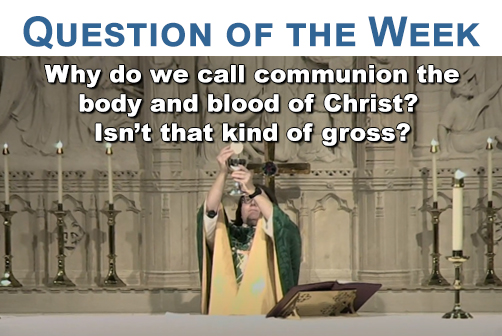
Question of the Week: Why do we call communion the body and blood of Christ? Isn’t that kind of gross?
If you’ve ever taken communion at Bethesda you’ll notice that someone hands you a piece of bread and says, “The body of Christ, the bread of heaven.” And then, someone offers you a chalice full of wine and says, “The blood of Christ, the cup of salvation.” The reason they say these things is because the last time that Jesus was with his disciples, before he was crucified, he shared a meal with them that was made up of these things: bread and wine. At that meal, Jesus told his followers that they should keep getting together and sharing this meal which we now call communion. Now, just like a lot of things in the history of the Church, this story has been interpreted to mean different things. For some Christians, they thought Jesus literally meant that if they shared the meal of communion that the bread and wine would become the body and blood of Jesus. There were other Christians that thought if they shared the meal of communion that the bread and wine would remind them of who Jesus was and why his teachings were important. Like with most things, we Episcopalians believe something in the middle of those two points of view. We don’t believe that the bread and wine at communion literally becomes the body and blood of Jesus, but we do believe that something more than just remembering who Jesus was is happening. We believe that when we all take communion that Jesus is there with us, just like he was with his disciples at that last meal. We believe that he is present with us in the most holy space of our church, and we may not be able to see him, but his body and blood and all the things that make him a person like you and me are there. Because Jesus is always more than just a memory for us. He’s a real person who is also the presence of God in this world. That’s why we remind ourselves that he is with us when we take communion.
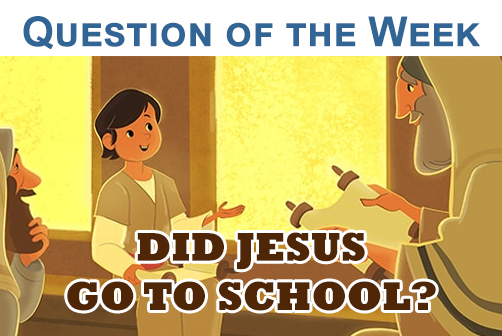
Question of the Week: Did Jesus go to school?
Not the way we know it. We actually don’t have many stories from when Jesus was a kid. We have stories about when he was born and then it jumps ahead to him being an adult and getting baptized by John the Baptist. There’s a big gap of time where we don’t really know what’s going on with Jesus. That is except for one story. Around the time Jesus was twelve years old, he went with his parents to Jerusalem for a special festival called the Passover. After the festival was over, his parents were traveling with a crowd back home and they realized that Jesus was missing. They went back to Jerusalem to see where he was. It turns out that Jesus had stayed behind and was in the temple teaching the elders about God. So, Jesus did go to “school” in a way. It’s just that he was so special that he was actually a teacher as a child rather than a student. There are a couple of lessons that go hand-in-hand with this story. The first is that you should never walk away from your parents without them knowing where you are. The second is that God is always teaching us about life, love, community, and everything that makes us who we are. God wants us to learn. God is pro-education. That thirst for knowledge is a gift from the Almighty and we should always pursue learning more and more about the world around us.

Question of the Week: Did Jesus go to school?
Not the way we know it. We actually don’t have many stories from when Jesus was a kid. We have stories about when he was born and then it jumps ahead to him being an adult and getting baptized by John the Baptist. There’s a big gap of time where we don’t really know what’s going on with Jesus. That is except for one story. Around the time Jesus was twelve years old, he went with his parents to Jerusalem for a special festival called the Passover. After the festival was over, his parents were traveling with a crowd back home and they realized that Jesus was missing. They went back to Jerusalem to see where he was. It turns out that Jesus had stayed behind and was in the temple teaching the elders about God. So, Jesus did go to “school” in a way. It’s just that he was so special that he was actually a teacher as a child rather than a student. There are a couple of lessons that go hand-in-hand with this story. The first is that you should never walk away from your parents without them knowing where you are. The second is that God is always teaching us about life, love, community, and everything that makes us who we are. God wants us to learn. God is pro-education. That thirst for knowledge is a gift from the Almighty and we should always pursue learning more and more about the world around us.
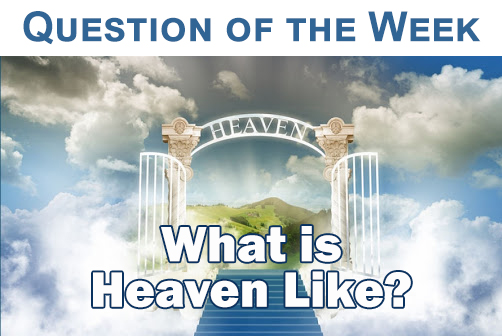
Question of the Week: What is heaven like?
I don’t know. The bible describes what we call Heaven in a lot of ways. Jesus calls it Paradise at one point. There are also passages that describe a city with streets of gold. And there’s even one that says God will wipe away every tear from your eye. So, it sounds nice. But, did you know that Jesus didn’t talk about Heaven nearly as much as he talked about the Kingdom of God? In fact, most of the parables that he told including the parable of the Prodigal Son, the parable of the Lost Sheep, the parable of the Good Samaritan are all about what the Kingdom of God looks like. It’s a place that’s forgiving. It’s a place that’s incomplete without all of us. It’s a place that cares for those who are often overlooked. I’m not sure, but that sounds a lot like paradise to me. The difference between the Kingdom of God and Heaven is that we can create the Kingdom of God right now. We don’t have to wait to go to heaven, we can get started on creating a world that looks a lot like the paradise of Jesus’s stories here. In fact, Jesus told us to do this. Every week we pray this line, “Thy kingdom come ON EARTH as it is in heaven.” So, don’t worry about heaven. That’s God’s job to take care of. Let’s get to work creating the Kingdom of God. That’s our job. And Jesus gave us a TON of examples to get started.
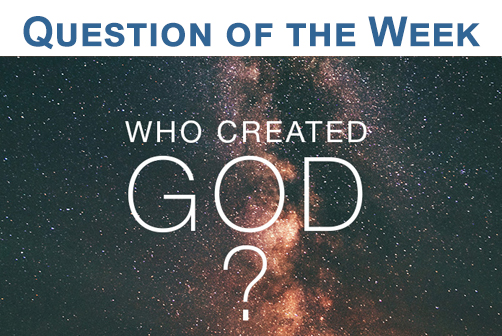
Question of the Week: Who Created God?
Nobody created God. It’s funny, when Moses first encounters God in the book of Exodus he asks God what His name is. And God says, “I AM.” So that means that God never started, He was just always there. It also means that God never ends either. He’s just always there. That’s a hard thing for people like you and me to comprehend. Because everything we know in life has a beginning and an end. That difference can make it hard to understand God. Luckily for us, Jesus came to tell us what God was like. He told us that God loves us. He told us that God cares about us even when it doesn’t seem like it. He told us that when we help each other and put other people’s needs ahead of our own, that we’re doing what God wants us to do. So, when things seem scary, or unfair, or confusing, we know that we don’t have to worry. Because God has seen everything that’s ever happened or will ever happen. And He’s looking out for all of us.

Question of the Week: Is it pronounced “Ay-men” or “Ah-men”?
When I was growing up in North Carolina, I don’t think I heard a single person ever pronounce it “Ah-men”. It was always “Ay-men” and people would shout it out all the time, in the middle of sermons, at the end of hymns, during prayers. Here at Bethesda, we’re very much in the “Ah-men” camp which is the correct way to say it historically. Amen is a Hebrew word which simply means “so be it”. That’s why we put it at the end of prayers that we offer to God or some churches will even add it to the end of a hymn praising God. It’s a recognition that we, as a community, all agree with what has just been said. So, no matter how you say it, just know that the importance of the word “Amen” lies in the fact that we all say it together.
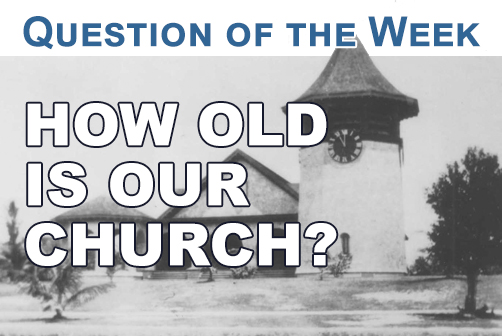
Question of the Week: How old is our Church?
Pretty old. The people who started The Church of Bethesda-by-the-Sea first met in 1889. That’s a long time ago! They didn’t meet in the building that we currently call home, though. This church building began being built in 1925 (almost 100 years ago) and we’ve been here ever since. So, yes, our church building is pretty old. But, did you know that the “Church” is actually not a place? The Church is actually the people that gather together. You are the Church. I am the Church. The clergy, the choir, your parents, the babies in our nursery, the Vestry members, we are all the Church because we are followers of Jesus Christ. So, you could say that even though the building we worship in is pretty old, the Church is actually much older than that because it goes all the way back to the first people who followed Jesus. We’re all a part of that! And even though things seem pretty hard right now because we can’t come together and worship in our pretty church building, the Church has been through things that were MUCH harder and we’re still here. And, knowing that God has been with His Church for this long, it’s a pretty safe bet that He’s going to be with us even when we don’t know what the future holds.

Question of the Week: What does God Eat?
That’s a great question! I don’t know. If I were God, I would eat nothing but hot fudge sundaes and I would never eat onions (blech!) There’s actually no way for us to know what God would eat, but we do know a little bit about what Jesus ate. We know that he ate fish and drank wine. And we know that he shared bread with his friends. In fact, one of the most important things that Jesus ever did was share a meal with the disciples. At that meal he passed around bread and a cup of wine and he told his followers to keep doing that special meal even after he died, because every time they ate that meal they would remember how important Jesus was. We still remember this meal every week at church. It’s called communion and it reminds us that because we share this special meal with each other, we share it with Jesus and everyone who has ever followed him. It reminds us that we are all connected even if we are far away from each other, upset with each other, or we’ve never even met each other. It’s God’s special meal for His people. And it’s probably what God would eat too in between hot fudge sundaes.
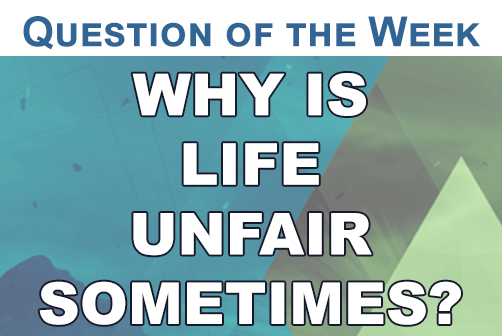
Question of the Week: Why is life unfair sometimes?
That’s something we’re asking ourselves a lot right now. Some of us have had summer vacations canceled. Some have missed out on camp. And some of us have had major things happen in our life like the loss of a loved one or the arrival of a new baby brother or sister. And it feels like the sad things are more sad and the happy things are less happy because we all have to stay home and take care of ourselves during the coronavirus. It’s not fair. There are lots of stories in the Bible where God’s people have complained to God about just that very thing, that they were good and they did everything that was asked of them and still something unfair would happen. And do you know what God did? He came down to Earth in the form of Jesus and taught us this: “Life can be frustrating sometimes. It can seem like you do everything right and that God just doesn’t care. But, God does care. God loves this world and everyone in it so much that God sent me, his Son, so that everyone would learn how much they are loved!” Jesus reminds us that life will have good times and bad, but that God’s love will never leave us alone. God promises to be with us through this life and whatever comes next. And that is a gift that’s more than fair.

Question of the Week: Why did God make bugs?
I know, right? Bugs are gross and slimy looking. Even worse, some of them can sting and bite you. So, why would God, who loves us, surround us with all of these creepy and crawly things. Well, it turns out that bugs actually have very important jobs. Worms help aerate and enrich soil. Bees help pollenate flowers. Even palmetto bugs and termites have jobs to do in God’s creation. Everything has a place in God’s world, even the things that we don’t understand. You and I also have a place in God’s creation, to share the Good News of God’s love with everyone by helping those in need and taking care of the world God has given us.
